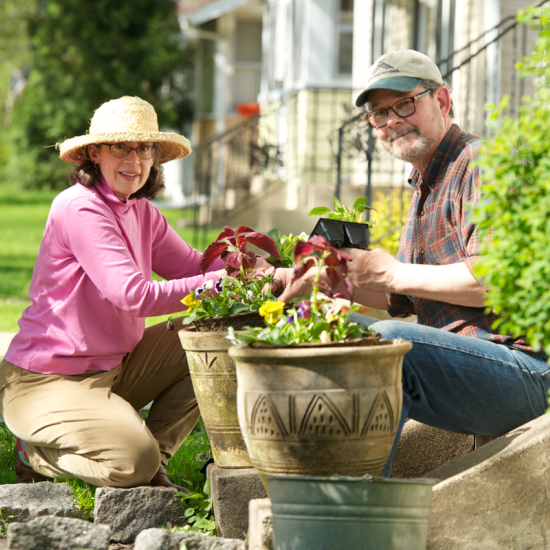Great Plains Senior Services Collaborative supports older adults to remain healthy and in their homes
A 2018 AARP survey of adults shows that 3 out of 4 adults age 50 and older want to stay in their homes and communities as they age, yet many don’t see that happening for them. Older adults living in rural communities face additional challenges to living independently, such as limited access to transportation and health care services, isolation and loneliness, and food insecurity.
Lutheran Services in America created the Great Plains Senior Services Collaborative to support staff in its member organizations in the rural communities of Minnesota, North Dakota and Montana. Staff serve older adults in rural communities, particularly those living alone, who often have multiple comorbidities and/or high levels of social isolation and depression.
The goal of the Collaborative was to help its member organizations more effectively expand and coordinate community-based services and support for rural older adults to improve their health and quality of life and allow them to remain in their homes. The Collaborative accomplished this by:
- Facilitating the sharing of resources and expertise
- Enabling broader scale adoption from learnings
- Establishing an environment of accountability
With the onset of COVID-19, the Collaborative and its members had new challenges to navigate in supporting older adults during a pandemic, as well as an opportunity to learn more about the resiliency, flexibility and value of the collaborative model during this unique period of time.
Evaluating the benefits, impact and sustainability of a collaborative model
Lutheran Services in America contracted with Wilder Research to conduct an evaluation of the Collaborative to determine how the model works, and gather information about the current work and perspectives of Collaborative members. In the midst of the evaluation, COVID-19 emerged as a global pandemic, which significantly shaped the remaining efforts and experiences of Collaborative members and the Collaborative overall.
Wilder used a mixed methods approach in the evaluation. Using quantitative and qualitative data collection activities, including discussions, activities and interviews, we captured leadership and staff members’ perspectives on the efforts, accomplishments, and long-term sustainability of the Collaborative, and facilitated more detailed reflections on the learning, process and outcomes of the work. This approach was particularly valuable in understanding the development and implementation of new strategies and programming by Collaborative members after COVID-19 was declared a global pandemic.
What we learned: Sharing knowledge and resources to improve services for older adults
The study results showed that overall, members saw the Collaborative as valuable to their work and viewed Collaborative communications, membership, process and structure, purpose, and resources positively with no significant shortcomings.
“The Collaborative is phenomenal. We wouldn’t be where we are without it. If we just had funding, but without the Collaborative, our program would look worse than it does now. People are there for you when you have challenges. I can’t speak highly enough.” – Collaborative member
Leadership and staff valued the Collaborative and the benefits it provided, including the shared learning, expertise and resources, which helped them in their work to achieve their missions, strategies and programs.
A key finding was that Collaborative members frequently shared resources and expertise related to program delivery and navigating pandemic-related challenges. A great example is about the use of technology like telehealth or remote care, to mitigate the impact of distance on providing services to older adults. Prior to the pandemic, few Collaborative members had well-established virtual programming in place and, of those who had no virtual programming, none had a clear plan for implementing it.
As a result of COVID-19 precautions (e.g. social distancing, limiting exposure of vulnerable populations such as older adults), Collaborative members transitioned to providing some or all of their services virtually. Study results showed that the Collaborative facilitated communication between staff from different member organizations, who were able to reach out to one another for support, while also being provided informational resources from Lutheran Services in America on available funding and resources like personal protective equipment.
“The three organizations would not be able to do what they are doing without getting input from others and some outside expertise. The shared learning model is really beneficial and has helped people come up with solutions that they may have never come up with, or has helped them come up with solutions faster than otherwise.” – Collaborative member
Recommendations: Making a valued Collaborative even better
Wilder Research analyzed feedback from study participants and identified several opportunities for the Collaborative to further develop and ensure it continues to provide the positive benefits they experienced.
Recommendations included pursuing additional evaluation such as Ripple Effects Mapping, which could provide a more robust description of the Collaborative’s impact. Members also identified in-person Collaborative meetings as a valuable benefit that helped build relationships and engage in informal information sharing and problem solving. That benefit was lost due to COVID-19, so a recommendation was to continue utilizing virtual meetings that provide opportunities for smaller group discussions, but plan for bringing members together for in-person gatherings when deemed safe and appropriate. Lastly, in order to create more opportunities for shared learning, the Collaborative could consider expanding membership to other organizations with similar state policy and funding environments.
